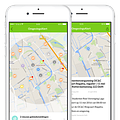As a real estate developer or builder, one of the most frustrating parts in the building process is the moment you need to secure the proper permits and the associated waiting periods where neighbours can object to the plans you envisioned for the lot. As we already discussed two weeks ago, it’s probably a good idea to give the community a voice in changes in the community, especially seeing how impactful they can be. However, in 2021, one would think that there were more efficient ways to communicate with neighbours than placing a permit sign and wait.
That traditional way of working is hopelessly inadequate towards local residents, especially when you, just like yours truly, hardly ever leave the house. It also opens up the possibility for malicious actors to strategically place their permit to deter neighbourhood intervention. Luckily, once again we find brave entrepreneurs trying to challenge the status-quo.
👽 What?
In this case, the challenger is called OmgevingsAlert (literal translation: surroundings aware). They offer a service where they warn you for possible permits that impact your location of interest. They provide support for different types of permits, not just building-permit related, but also event permits and other local permits. The service allows for the user to filter based on the type of permit, only serving you push notifications for the permits that you decide are relevant.
Imagery courtesy Omgevingsalert
They offer the functionality in two editions. One edition is intended to be used by citizens and is offered to local government as a white label application. The other version is aimed at real estate professionals and property managers that want to be able to react quickly to zone changes or who want to be aware of the impact that certain permits can have on one of their properties.
🤷 Who?
OmgevingsAlert consists of three people. Susan Pesman, Christiaan Rasch and Tom Pesman. It was launched in 2012 after Christiaan experienced first hand what the impact of missing a permit sign was and how hard it was to stay well-informed on the topic. Now, more than 40 Dutch municipalities offer the application to their citizens and the pro version has notable names as Albert Heijn, Lidl and CBRE as a client.
🕵️♀️ Who else?
Technology in proptech is often operating in a very fragmented landscape delineated by national borders, and this is another good example of this being the case. In the Netherlands, possibly inspired by the success of OmgevingsAlert, the national government already brought an application with similar capabilities to market. This is probably a problem area where governments, being the issuers of permits, are best placed to offer a comprehensive solution. When looking at the rest of Europe, we find that a permit database is often available online, but notification services are less ubiquitous.
👍 Why
The traditional way of communicating via a signboard is genius in its simplicity, but today an easier interface is available. Mimicking the real world on a map might fix the problem of giving a richer experience (linking to all the details of the permit), but it is actually worse in terms of discoverability. Turning discovery from a pull-model to a push-model is where the real innovations in the service that OmgevingsAlert brings. It makes the process more inclusive and reduces frustrations from citizens who see changes happening in their neighbourhood without feeling properly consulted.
The pro-version of the app seems even more interesting. For property investors, and operators, being able to predict the impact of certain permits on your (potential) properties can have a material impact on the bottom line.
👎 Why not?
This type of public information delivery should be universally available for everyone, without paying for additional licensing fees. A performant government shouldn’t open the possibility for information arbitrage based on public data, but instead provide it directly to all tax-payers.
📚 Further reading?
Article detailing the start of omgevingsalert
✨ Giphty
Or you could opt for the shortened route to obtain a permit.




